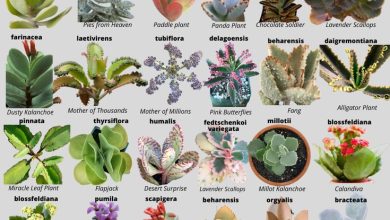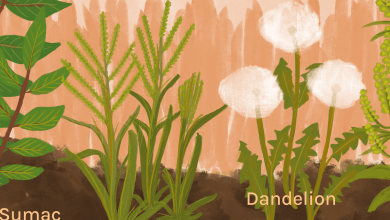How to Fertilize a Lemon Tree: [Components and Needs]
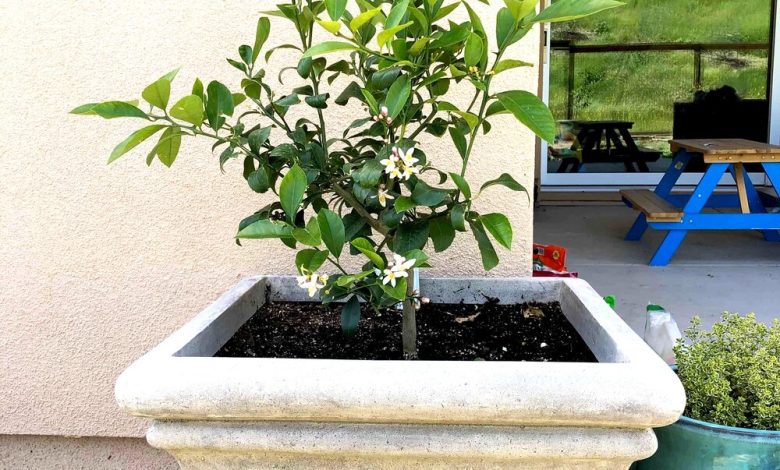
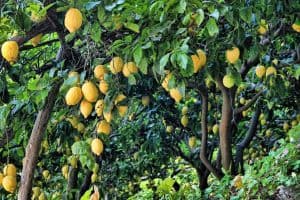 The lemon tree is one of the citrus trees that we can have in the garden without many worries because it develops well.
The lemon tree is one of the citrus trees that we can have in the garden without many worries because it develops well.
To help you get your work done more easily, one of the best tools we have is knowing how to pay for it.
Have you considered what needs you may have?
You may also be interested in: Pests and diseases of the lemon tree
Why fertilize a lemon tree?
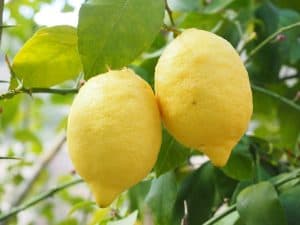 The lemon tree, unlike other species, is a tree that maintains its fixed leaves throughout the year.
The lemon tree, unlike other species, is a tree that maintains its fixed leaves throughout the year.
This does not mean that it is not necessary to prepare it and accompany it during the flowering process, which is the one that demands the most energy.
And it is a fact that although most of the time it grows and develops without complications, paying it well is essential.
What does the lemon tree need?
For the lemon tree to be healthy and in optimal conditions, it will need zinc, iron, nitrogen, ammonium nitrate, phosphorus and potassium.
Many of these components can be found in homemade fertilizers or else reinforce them with commercial products.
In any case, it will be essential before you sow that you evaluate the characteristics of the land.
If you have a very acidic pH, you need to balance it.
| Consumption in the development of new organs and growth of old organs (g/tree) | Seedling | Developing | Adult (over 12 years old) |
| Nitrogen (N) | 6.8 | 210 | 667 |
| phosphorus (P) | 0.8 | 18 | 53 |
| Potassium (K) | 3.6 | 121 | 347 |
| Magnesium (Mg) | 1.4 | 46 | 135 |
| Iron (Fe) | 0.04 | 1.1 | 3.4 |
| Consumption covered by reserves of old leaves (%) | Seedling | Developing | Adult (over 12 years old) |
| Nitrogen (N) | 25 | 32 | 32 |
| phosphorus (P) | 12 | 16 | 17 |
| Potassium (K) | 22 | 28 | 29 |
| Magnesium (Mg) | 24 | 30 | 30 |
| Iron (Fe) | 0.0 | 0.0 | 0.0 |
| Annual net needs (g/tree) | Seedling | Developing | Adult (over 12 years old) |
| Nitrogen (N) | 5.1 | 142 | 453 |
| phosphorus (P) | 0.7 | fifteen | 44 |
| Potassium (K) | 2.8 | 32 | 246 |
| Magnesium (Mg) | 1.0 | 32 | 95 |
| Iron (Fe) | 0.04 | 1.1 | 3.4 |
What are the main components of the fertilizer?
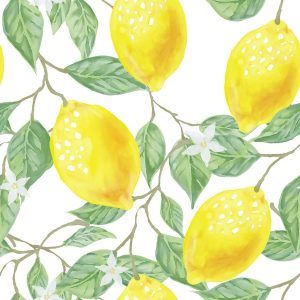 For the compost to be of good quality, it must contain many nutrients and organic matter.
For the compost to be of good quality, it must contain many nutrients and organic matter.
This is achieved by making homemade compost, but those that are bought in the market can also contain them.
The important thing is to make sure that it is very natural so that it does not cause side effects to the lemon plants.
What deficiencies can it have and how to detect them?
Presence of yellow leaves
The main symptom that dominates in a plant like the lemon tree with lack of nutrients is the presence of yellow leaves.
If this yellow color is detected that is occurring between the veins of the leaves, it is most likely that the plant is lacking in iron.
When what occurs is that the entire leaf turns yellow, it is probably a problem at the chlorophyll level.
It will be necessary to carry out an in-depth study of the nutritional conditions of the plant to detect what nutritional deficiency it has.
The lemon tree does not grow
In cases where the lemon tree does not grow, a condition known as dwarfism is assumed to be present.
The reality that operates in this condition is that there is an absolute lack of all the nutrients in the plant.
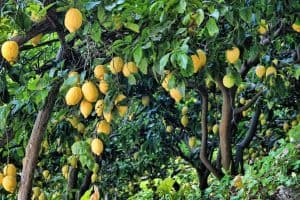 A possible reason for this to occur is that it was not planted in land that met the needs it required.
A possible reason for this to occur is that it was not planted in land that met the needs it required.
It is also common that it is because the fertilizer was not applied at the right times, with the beginning of spring being the ideal period.
A good action that helps to work these conditions is to apply magnesium nitrate sprays directly on the leaves.
However, if this does not work, you should think about whether the condition is being caused by other conditions such as lack of irrigation, for example.
How to make a compound fertilizer for lemon trees step by step?
In the market there are some fertilizers that can be useful to work with the lemon tree, but with some time at home it will be free.
So for now, the most advisable thing is to do all the work ourselves because in the end what it does is to take advantage of the waste.
So, the step by step will be like this:
- If you have a composter at home it will be ideal, if not, a container that is only used for this purpose will suffice.
- Inside you can place all the organic waste that you generate at home, such as the skin of potatoes, the roots of vegetables, among others.
- To boost the quality of the compost, a good plan is to add some manure from farm animals, such as cow manure.
- All this mixture will be worked with a little water, stirring.
- To ensure that the spoilage bacteria can work normally, it will be necessary to cover the container with a cloth.
- This will have to be removed on some occasions so that air can enter it.
- After three weeks it will be necessary to check the state of the homemade organic matter such as the compost which should look like a more or less homogeneous paste.
- Apply on the land to be fertilized, according to the needs.
When you want the compost to contain a higher level of calcium, you can add some crushed eggshells on top of the compost in the soil.
If you are looking to obtain a greater amount of iron or another component, add it to the mixture and that’s it.
With all this information, it will be more than enough for the lemon tree to be in perfect condition and the fertilizer is not abused.
Where to buy fertilizer for a lemon tree?
It is best to go to a nursery or a specialized store in your area. However, if you don’t have access to either, we might recommend these products on Amazon:
Discount!  Fertilizer for Citrus and Fruit Trees – Bucket 5kg
Fertilizer for Citrus and Fruit Trees – Bucket 5kg
- Batlle Citrus and Fruit Fertilizer is a granulated fertilizer, formulated with a balanced ratio of nutrients, which…
- large floral induction, fruit set and fattening in the production period. Contains micronutrients that…
- Composition: CE fertilizer. NPK 14-8-12 + 2MgO fertilizer with micronutrients
- Dose: Apply by spreading evenly at a rate of 40g/m2
€19.95 −€1.35 €18.60 View on Amazon Prices with VAT without transport
Last updated on 2022-07-31 / Affiliate Links / Affiliate API Images
 Expert Advice Citrus Organico Organomineral fertilizer specific for citrus, 5 kg
Expert Advice Citrus Organico Organomineral fertilizer specific for citrus, 5 kg
- Npk 6-5-5 contains a high percentage of natural organic substances such as corknut, hops and neem panel.
- The neem panel is a substance of vegetable origin that restores the fertility of the exploited territories and favors…
- Distributed regularly throughout the year, it guarantees complete nutrition and optimal plant development.
- Fertilization period: from March to November; Frequency: every 30-40 days; How to use: shoot, lightly bury and…
View on Amazon Prices with VAT without transport
Last updated on 2022-07-26 / Affiliate Links / Affiliate API Images
 Suinga 500 KG ORGANIC FERTILIZER FERTILIZER Humus OF WORMS, Bags of 25 Kg – 41 liters. Suitable for organic farming
Suinga 500 KG ORGANIC FERTILIZER FERTILIZER Humus OF WORMS, Bags of 25 Kg – 41 liters. Suitable for organic farming
- Organic fertilizer suitable for Organic Farming obtained from earthworm droppings.
- They help the growth and development of all kinds of plants, improving the soil and caring for the environment.
- The earthworm humus is a product of organic origin that results from the transformation of animal manure carried out…
- It serves as a substrate for seedbeds (we recommend mixing with coconut fiber)
View on Amazon Prices with VAT without transport
Last updated on 2022-07-26 / Affiliate Links / Affiliate API Images
References and bibliography
- https://www.mapa.gob.es/ministerio/pags/biblioteca/revistas/pdf_Vrural/Vrural_2006_237_44_48.pdf
- https://www.miteco.gob.es/ministerio/pags/Biblioteca/Revistas/pdf_Agri/Agri_2007_895_285_293.pdf
- https://www.mapa.gob.es/ministerio/pags/biblioteca/revistas/pdf_Vrural/Vrural_2005_210_24_29.pdf
- https://www.researchgate.net/profile/Jesus_Medina5/publication/280924911_CULTIVO_DE_LOS_CITRICOS/links/55cb963c08aeb975674c7eb9.pdf

![Photo of How to Plant Green Beans: Complete Guide [Steps to Follow + Images]](https://www.complete-gardening.com/wp-content/uploads/2022/08/how-to-plant-green-beans-complete-guide-steps-to-follow-images-390x220.jpg)
